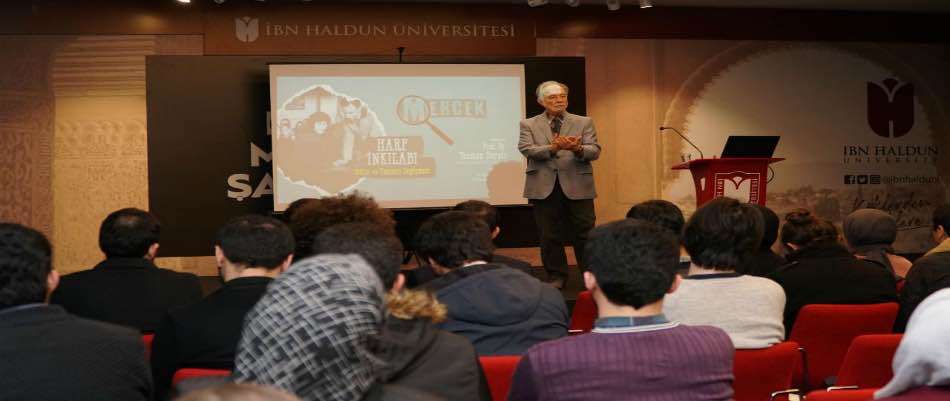


Professor Dr. Teoman Duralı, lecturer at the Department of Philosophy at Ibn Haldun University, said that the alphabet reform has brought us back to the beginning by breaking off our cultural and civilizational heritage.
Speaking at the conference on "Letter Revolution: Changing Language and Writing" within the scope of the "Lens" series of the Department of Arts, Culture and Sports of Ibn Haldun University, Professor Doctor Teoman Durali emphasized that language is the carrier element of culture and civilization and said that this is conveyed in writing. Durali explained that the assumption that we started to use the Arabic alphabet during the Ottoman period was wrong and the dire consequences of changing the script were as follows: “It is generally assumed that we started to use the Arabic alphabet together with the Ottomans. However, we have used the Arabic alphabet since the 9th century. Karakhanids, Ghaznavids, Seljuks, Baburs and Ottomans... With this article, we have come to the fore as a distinguished culture within the Islamic Civilization. The cancellation of the article brought us back to the beginning. Can we make up for this great loss? No, we can't. We learn Ottoman Turkish, we can use it as an auxiliary tool, but it will not be a balm for the wound. Because we lost the spirit of the words we put forward with language. Professor Durali, who said that the alphabet combined with writing creates a spirit, said, “For example, Persian is an exquisite language. It is meaningless to see a Persian script in Latin. Because Persian has been combined with Arabic letters, it has become integrated.” He emphasized the importance of the unity of language and writing with his words.
“Many of the problems we experience today, including violence against women, are related to changing language and writing.”
Professor Doctor Teoman Duralı underlined that the disconnection of the society with its cultural genes isolating us from our cultural and civilizational values, and explained the situation in which we are far from recognizing and understanding the cultural heritage as follows:
“You can't love what you don't understand. For example, the generation gap between me and my father was an abyss. I could only understand my father after I lost him, but it was too late. This is very sad for me. This situation has been experienced in different dimensions by each individual of the society.” Duralı stated that his own generation experienced such a terrifying cultural inheritance with the change of language and writing, and said that this situation was felt in all areas of the society and that the next generations became uncultured, unaware of even the existence of the problem.
Professor Doctor Teoman Duralı stated that many problems in society stem from the fragmentation of cultural inheritance as a result of the alphabet reform, because people almost lost their minds in this fragmentation, and continued his words as follows:
“The word is the living history of the culture to which it belongs. Every word carries traces of the past and present of the civilization and culture it belongs to. The inheritance of humanity is culture, the carrier element of culture is words. Morality is unique to humans, not animals. Compassion, self-sacrifice, virtue and chastity are peculiar to human beings. These are volitional events, in animals it is instinct. human autonomy and Freedom is God's gift. Man is autonomous and human instincts are almost nonexistent. The clearest indicator of all this is language. Language is the literature in which the mind announces itself the most. Nations with strong literature are societies with high cultural level."